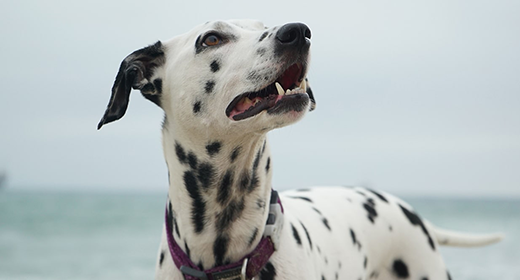

Some of the best indicators of your dog's health are its skin and coat conditions. A healthy dog coat should be shiny and smooth, not rough or brittle. When it comes to healthy skin, your dog's skin should be soft and smooth, not greasy or flaky. Good nutrition is one of the main factors in maintaining your dog’s health in terms of a luscious coat and soft skin. Apart from that, your dog’s coat and skin can also be taken care of through regular grooming and skincare routines that will help keep its hair free of tangles and its skin free of any irritation.
If you think that achieving healthy skin and healthy coat in dogs is difficult, it’s time for you to learn more about dog health and grooming. Let’s explore more about how you can achieve a healthy dog coat and skin for your floof.
The first thing that any pet parent thinks of when it comes to maintaining their dog’s skin and coat health is grooming. While grooming plays a significant role in making sure that your dog has a shiny coat and soft skin, health plays a bigger part in ensuring your floof’s appearance.
If you have been grooming your dog well and are still wondering why its coat and skin are not appearing the way they should, chances are that there is an internal issue. A shiny coat and supple skin on the outside start with a healthy dog on the inside. If your dog has flaky, bumpy, dull, or dry skin/coat, it could be an indicator that something is wrong. The first thing you need to do is book an appointment with your vet and cross out any underlying issues.
The skin is the largest organ of any animal's body. For dogs, most of their skin is covered with hair that sheds regularly or is constantly growing, in non-shedding breeds. Just like how we require a balanced diet full of high-quality digest table food types to keep our skin and hair in a healthy state, dogs also need to maintain their diet and make sure that their body is receiving the right amount of calories each day to maintain energy levels. If a dog is not eating well or is eating poor-quality food, its body will take longer to eliminate the waste products and cause the kidneys and liver to work twice as hard.
That being said, good nutrition is key to a healthy dog coat and skin. A dog that meets its dietary needs every day will boast soft, supple skin, and luscious, glowing hair.
Many pet parents struggle with maintaining their dog's skin and find it to be one of the most difficult tasks. In reality, achieving goals as such is fairly easy, provided you feed your dog the right nutrients and make sure that its diet meets its bodily requirements. Here are a few things you can do to maintain a healthy dog coat and skin:
Your dog needs to maintain a complete and balanced diet to achieve healthy skin and a glossy coat. Proteins, fats, carbohydrates, minerals, and vitamins need to be fed to your dog in balanced ratios. It is very important for dogs to meet their daily calorie intake so that they have enough energy to facilitate new hair growth and skin cell turnover. If your dog's diet is not easily digestible or contains poor-quality ingredients, it may not be able to create enough energy through its diet. Make sure that everything you feed your dog contains high-quality ingredients and does not pose a risk to your dog's health.
There are so many supplements available in the market today. While you may get confused between jars and bags of supplements promoted for healthy coat growth in dogs, the majority of these products contain a source of omega-3 fatty acids combined with a range of other ingredients. Omega-3 fatty acids have scientifically proven to be one of the most beneficial supplements that you can give your dog for a glossy coat and smooth skin. Omega-3 fatty acids are not just effective anti-inflammatory agents but are also capable of bulking up your dog’s skin’s natural fatty acid barrier to add that extra shine.
Bathing your dog is extremely important as it will remove any dust, debris, dirt, and odour from its skin and coat. If there are any allergens on your dog's skin, a good bath is the solution to this irritating problem. Generally, dogs should be bathed every 2 to 4 weeks depending on their breed's needs. If your vet has advised a different routine, make sure you follow that. It is best not to bathe your dog too much because that can result in flaky skin and can dry out your dog's coat. If your dog has any allergies or does not react well to a dog shampoo or soap, consult your vet and find the right products for your floof.
Dogs that suffer from allergies experience inflammation in their skin that can cause redness and itchiness. This makes them itch and scratch which ruptures their skin barrier, allowing other infections to enter your floof’s body. Unfortunately, allergies cannot be cured and can only be treated. For this reason, it’s important to know how to manage your dog's allergies by consulting a wet.
Fleas and ticks are the most common parasite irritants that will affect your dog's skin at some point in its life. These parasites can cause intense scratching, chewing, and biting of the skin. These acts of self-inflicted trauma can lead to tears in the skin barrier, leaving your dog with crusty, irritable, and red skin. Additionally, some fleas and ticks carry illnesses that can be fatal. It is best to keep your dogs protected against these parasites all around by consulting a vet and doing the needful.
Maintaining overall health for your dog to achieve a shiny coat and soft skin is extremely important. Make sure your dog is being fed a balanced diet and the right nutrients. it is also important for your dog to have a good exercise routine so that it is just not lazing around the house. A dog that is well rested, well fed, and receiving the right nutrients is set to flaunt healthy dog skin and coat.
It is imperative that pet parents keep good food for dog skin in mind and also administer nutrients that aid in a shiny, glossy coat. Now that you know what you need to do as a responsible pet parent, you are all set to give your floof its best life.
A healthy dog coat is shiny, luscious, and soft. If your dog has a rough coat with coarse hair, it is time to adapt a routine to change the condition of your floof’s coat.
Healthy dog skin is soft and supple, free of any irritation. If your dog has irritated, red, bumpy, or flaky skin, it is time to see a vet and figure out the best plan of action.
Vitamins and minerals such as vitamin E, vitamin C, Biotin, and omega-3 fatty acids aid in healthy dog skin and fur.


Have you ever wondered why some dogs seem a bit heavier than they should be? Dogs, like humans, can face weight issues, and it's crucial to ensure that they are in their best shape. In today's world of treats and limited exercise, more and more pet parents find themselves asking, 'Why is my dog fat?'. Dealing with dogs and weight loss can be tricky to work along if you don’t know how to go about on this journey of weight loss in dogs. Yet, how should you know if your dog is gaining weight and how to make your dog lose weight?
These days, dogs are grappling with weight issues. And as a dog parent, you must take a closer look at your pet’s body condition. Be curious about questions like, can you feel your dog's ribs easily? Is there a visible waistline? These observations play an essential role in assessing whether your canine companion needs assistance in the weight department. If you find your dog needing help with weight loss, then you must act promptly. Let's explore canine weight management and how to help dog lose weight.
Maintaining a healthy weight for your dog is not just about the appearance; it's about their overall well-being. Dogs with excess weight face health risks, including diabetes and heart diseases. Understanding why your dog is gaining weight would be the first step towards ensuring a longer and healthier life for your furry friend. Overweight and obese dogs often have shorter life spans, emphasising the need to act promptly. This is why it is essential for you to start considering weight loss by providing your pooch with a healthy and hearty lifestyle.
Struggling with dogs and weight loss can be stressful for pet parents. However, fret not. Here is what you need to do to start your dog’s journey towards weight loss:
A balanced diet contains all essential nutrients required for your pooch’s healthy growth. Consulting your vet for a tailored meal plan is suggested when planning your dog’s weight loss journey. It is also important to choose high-quality, low-calorie dog food to maintain a balanced diet. Portion control should be practiced to avoid overfeeding and excessive calorie intake.
One of the key elements to dogs losing weight is regular and consistent exercise. Develop a regular exercise routine tailored to your dog's breed and age. Take your floof for brisk walks, play a game of fetch, or simply plunge into the pool for swimming to keep them active. Gradually increase the intensity and duration of exercise for gradual weight loss. It is also recommended to combine regular exercising with healthier food for best results.
Your pooch’s weight problem can also be linked to numerous medical conditions. It is best to schedule regular vet visits to rule out underlying health issues causing weight gain. Conditions like thyroid problems may contribute to weight gain in dogs. Discuss appropriate medications or supplements with your vet for well-guided canine weight loss.
Consistently monitor your dog's progress and adjust the plan as needed. Gradual weight loss is ideal to prevent health complications. If you notice your fur baby losing or gaining too much weight within a short period, then you should get them checked by a vet. Stick to the plan even after your dog achieves their target weight for overall well-being.
While it's essential to encourage weight loss, it's equally crucial to ensure your dog doesn't lose weight too quickly or in an unhealthy manner.
While shedding that extra weight is essential, you need to make sure your fur baby’s weight loss journey is healthy and effective for a longer period. Given below are a few things you should be mindful of to avoid abnormal weight loss in dogs:
Helping your dog achieve and maintain a healthy weight is essential for their overall well-being. By following the aforementioned steps, consulting your vet, and observing your furry friend closely, you can contribute to a happier life together. Create a healthy weight loss plan, so your dog leads a happy life.